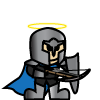Would you say that it was balanced if they had, in fact, come out with something identical to 3.5 after long, careful, and logical thought, and having settled on the precise interplay of classes, feats, and spells that we see?
See, I'm disagreeing with the idea that it is correct to define perfect balance as "it does what the designers intended". Certainly, that's a useful property, but it's not the same as balance; otherwise, it is meaningless to discuss how much to prioritize balance in your design, since obviously however much effort you put into it is enough, as long as you're aware of the consequences. Simply saying "sure, it's balanced, the designers thought about it carefully and it turned out like they expected" is pointless if that wasn't even the goal at all.
Instead, there should be an objective way to evaluate how well the designers did on a specific area of the game, based not on whether they intended what they wrote as a whole, but whether the result is good or bad. Balance isn't the only consideration in game design, or even necessarily the most important. But it does need a metric of its own, separate from other ways to evaluate a game's quality.
Don't reduce "is this game good in various ways" to "does it do what its designers expected".
Given some of the crap optimizers pull and how hostile most of them are, it's a very hard sell to say that it's bad if the game is not fun for optimizers.I'm not referring to cheaters, to munchkins, or even to powergamers. Instead, I'm referring to optimizers: those who a) have a given character concept and b) wish it to perform well against challenges without overshadowing allies. [Or, as the case may be, those who a) wish to build a character capable of performing well without inciting envy and b) fine-tune a concept from that.]
The confusion is natural, perhaps, since munchkins tend to adopt the name "optimizer" as a sort of protective camouflage, trying to avoid repercussions. Unfortunately, accepting this sort of evasion doesn't do anyone any favors.
If you don't care whether it's possible to improve the effectiveness of the characters you create, that's fine, but a lot of people do, and by no means all of them are fun-hating jerks. (Not even close.)
View Single Post
Thread: D&D 5th Edition: Thread #7
-
2012-10-19, 03:10 AM (ISO 8601)Titan in the Playground


- Join Date
- Jun 2011
- Gender

 Re: D&D 5th Edition: Thread #7
Projects: Homebrew, Gentlemen's Agreement, DMPCs, Forbidden Knowledge safety, and Top Ten Worst. Also, Quotes and RACSD are good.
Re: D&D 5th Edition: Thread #7
Projects: Homebrew, Gentlemen's Agreement, DMPCs, Forbidden Knowledge safety, and Top Ten Worst. Also, Quotes and RACSD are good.
Anyone knows blue is for sarcas'ing in · "Take 10 SAN damage from Dark Orchid" · Use of gray may indicate nitpicking · Green is sincerity



